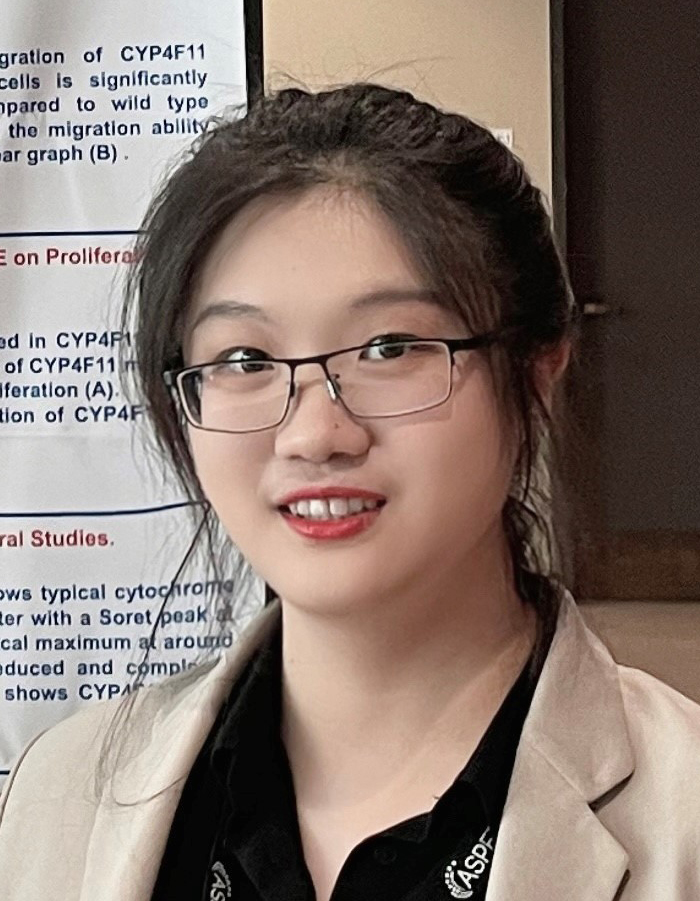Each month, the editors of three of the American Society for Pharmacology and Experimental Therapeutic’s (ASPET) journals choose who they call their Highlighted Trainee Authors. These early career scientists are recognized for their innovative research published in The Journal of Pharmacology and Experimental Therapeutics, Drug Metabolism and Disposition, and Molecular Pharmacology. This feature showcases these young scientists, demonstrates what drives them and reveals why pharmacology is important to them.

Huiting Jia
Huiting Jia is a second-year PhD student majoring in biomedical pharmacology at the University of Pittsburgh. Jia’s aspirations to pursue pharmacology began at the age of 18, after witnessing her grandfather battle cancer. She is now devoted to finding more efficient cancer therapeutics and seeking an academic career in cancer research.
With lung cancer the leading type of cancer deaths worldwide, Jia hopes her research will help identify new targeted therapeutics for improving the drug efficacy of lung cancer treatment.
“Our long-term goal is to develop a promising candidate for targeted therapeutics in lung cancer. We believe that developing a CYP4F11 inhibitor could be beneficial for lung cancer therapeutics, which will impact researchers in the field of pharmacology to develop target therapeutics for cancer in the future,” said Jia.
Jia believes that publication in an ASPET journal provides an opportunity for her work to be visible and discoverable among other researchers in the field of P450 and cancer, including others who might be interested in drug-metabolizing enzymes or their cellular mechanism in cancer.
Publishing her research in Drug Metabolism and Disposition “preserves my work in a permanent form of recording, [and] involves me in a systematic, professional network of drug-metabolizing enzyme studies, which allows me to contribute my work to the field of drug metabolism and disposition,” Jia explained.



Neha Mishra
Neha Mishra is a postdoctoral research associate at the University of Colorado, Anschutz Medical Campus. Mishra’s research focuses on ocular and dermal vesicant induced toxicities. She wants to unravel the mechanistic aspects of vesicant-induced injuries, and effective as well as targeted therapeutic development to prevent, hinder and/or reverse these processes.
“I want to understand common and unique pathways of toxicity upon exposure to different vesicants and develop countermeasures for the same. I want to have a career in academics where I can decipher these riddles and, in the process, contribute to society,” said Mishra.
Mishra’s recent study shows the efficacy of dexamethasone in treatment of vesicant induced injuries and paves the way for further studies on repurposing drugs a wider range of indications.
“It gives me great joy to be able to publish two original research articles in one calendar year in this premier, peer-reviewed, internationally recognized, scientific journal that is well reputed worldwide and has been in circulation for over a century,” Mishra stated.



Miriam Richardson
Miriam Richardson is a research assistant in the field of neuroscience and will be pursuing her PhD soon. During her undergraduate degree, she was drawn towards neuroscience. With so little known about the complex networking of the brain, this was a clear impetus for her to discover more and use this to develop innovative therapeutics.
Richardson also hopes to expand the current knowledge regarding the pathophysiology of Parkinson’s disease and other neurodegenerative diseases.
“I intend to further the understanding of senolytic drugs and their role in treatment of Parkinson’s disease. My ultimate goal is to develop a novel and improved senolytic that may treat this neurodegenerative condition efficiently,” said Richardson.
Richardson believes that by understanding the biological pathways responsible for these belligerent disorders, she can contribute to the design of novel drugs that halt disease progression.
“It is an honor to have my effort in the field of pharmacology and neuroscience recognized by Molecular Pharmacology and ASPET. I have a keen interest in senescence and senolytic drugs, and in my review, I have comprehensively researched and analyzed the current knowledge and trends in the hope that other scientists will benefit. My publication will hopefully contribute to the development of new treatments,” said Richardson.
